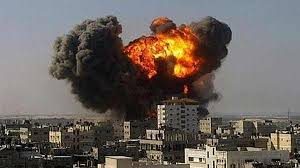 As Russia and the United States continue to disagree at the United Nations on the terms of extending the ceasefire, President Assad announced that the seven-day ceasefire, began on September 12, has ended and launched a new offensive on the rebel-held part of Aleppo.
As Russia and the United States continue to disagree at the United Nations on the terms of extending the ceasefire, President Assad announced that the seven-day ceasefire, began on September 12, has ended and launched a new offensive on the rebel-held part of Aleppo.
The regime’s bombings seemed to be intense as Ammar al-Selmo, the head of the civil defense rescue service in rebel-held eastern Aleppo, said “it’s as if the planes are trying to compensate for all the days they didn’t drop bombs” during the ceasefire. The government has created exit points for civilians and rebels who want to flee the area.
Both Moscow and Washington are claiming that they want to reestablish the ceasefire but they are yet to reach an agreement. Foreign Minister Sergei Lavrov and Secretary of State John Kerry had a heated exchange of words accusing each other of being uncompromising and unwilling to reach an agreement at the International Syria Support Group meeting. UN special envoy for Syria, Staffan de Mistura, said the meeting was “long, painful and disappointing” as he looks forward to another round on Friday.
China attended the meeting and its Vice Foreign Minister, Li Baodong, said countries should focus on having a ceasefire at the same moment as political negotiations, humanitarian assistance and counter-terrorism. He urged countries to surpass national interests and geopolitical advantages to avoid greater global crises.
Recently, President Assad predicted that the war in his country would “drag on” because of its inclusiveness in a global conflict in which terror groups are backed by Qatar, Saudi Arabia, Turkey and the United States.
Meanwhile, the UN has announced that it was resuming aid deliveries to rebel-held areas after one of its convoys came under attack on Monday near Aleppo. No one has claimed responsibility.
